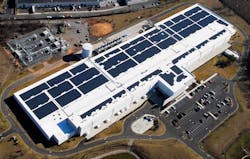QTS: Construction Fire Won't Delay Expansion at NJ Campus
QTS Data Centers said a fire at the company's campus in Piscataway, N.J. did not impact its operations and will not delay plans to expand its capacity at the site.
The fire broke out in the early hours of Nov. 23, with several local fire departments responding. The New Market Fire Department reported "heavy fire" on the roof of a structure on the QTS campus on Possumtown Road, and took about two hours to put it out. The event was noted by local news organizations and data center publications.
QTS says the fire did not affect its 360,000 square foot operational data center. The company has also been building a two-story 90,000 square foot expansion at the site.
"Early Wednesday morning, authorities responded to a fire on a concrete and steel structure under construction adjacent to QTS’ Piscataway data center," said a company spokesperson. "The local fire department was able fully extinguished the fire shortly after arrival.
"QTS determined that several pallets of roofing material stored on the roof for future installation caught fire. The cause has not been determined. No injuries or customer disruption was reported. The operational data center adjacent to the construction site was not impacted."
QTS operates more than 7 million square feet of data centers in 20 markets across North America and Europe, including large data center campuses in Northern Virginia, Chicago, Dallas, Atlanta and Portland. These large campuses position QTS for continued growth opportunities with hyperscale customers.
The Piscataway data center was built by DuPont Fabros Technology in 2012, and acquired by QTS in 2016 for $125 million. The building arrived on the market amid a surplus of space in New Jersey.
The New York/New Jersey data center market has since experienced a strong rebound, as stronger leasing in recent years has gradually absorbed vacant space. Consistent absorption of 20+ megawatts (MWs) over the last three years, has reduced the available supply to about 17 MWs of available capacity, according to data from JLL. That has providers in the Garden State shifting back into building mode.
The company has been in building mode since its acquisition by global investment giant Blackstone last year in a $10 billion deal. Earlier this year QTS filed plans to expand the Piscataway campus with a second data center. Those plans remain on track, the company said.
"Local authorities have indicated there is no longer a safety risk to the construction or production areas of the facility and QTS has resumed normal operations," said a company spokesperson. "QTS does not expect it to impact plans and schedule for expansion of the Piscataway data center campus. QTS appreciates the rapid response by fire authorities to quickly extinguish the fire on the structure under construction."
About the Author



